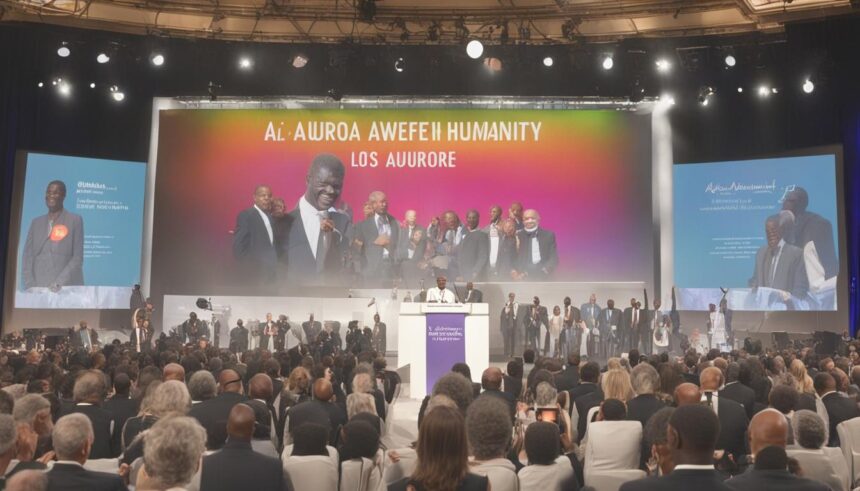Dr. Denis Mukwege, renowned Congolese gynecologist and human rights advocate, receives the 2024 Aurora Prize for his profound contributions to combating sexual violence and enhancing women’s rights in conflict zones.
In a commemorative event in Los Angeles, Dr. Denis Mukwege, a distinguished gynecological surgeon and fervent human rights activist from the Democratic Republic of the Congo (DRC), was awarded the prestigious 2024 Aurora Prize for Awakening Humanity. This honor not only highlights his unyielding dedication to combatting sexual violence and advocating for women’s rights but also comes with a $1 million award to support individuals and grassroots organizations aiding those in dire need.
Dr. Mukwege, who is the founder and head of Panzi Hospital in the DRC, has been at the forefront of the fight against sexual violence in conflict zones. Established in 1999, Panzi Hospital is renowned globally for its comprehensive care for survivors, providing not just medical treatment but also legal aid, socio-economic reintegration, and psychological services. Under Dr. Mukwege’s leadership, the hospital has treated over 80,000 survivors of sexual violence.
With sexual violence used systematically as a weapon of war in the eastern DRC, Dr. Mukwege’s courageous efforts to hold perpetrators accountable have been vital. His advocacy extends beyond the hospital wards as he continuously pressures both the Congolese government and international bodies to pursue justice for victims and strengthen protections for women in conflict regions. His passionate work earned him the Nobel Peace Prize in 2018, further solidifying his global influence and commitment to human rights.
The Aurora Prize, bestowed upon him this year, embodies a philosophy of celebrating and supporting those who go to extraordinary lengths to save, support, and uplift others. The ceremony which took place on the second day of the 2024 Aurora Prize Event, not only recognized Dr. Mukwege’s outstanding contributions but also aimed to shine a light on the overall impact of humanitarian efforts worldwide.
During his acceptance speech, Dr. Mukwege reflected deeply on his experiences, particularly highlighting a poignant story about a patient who, after recovering, was inspired to train as a nurse to help others affected by similar traumas. This narrative beautifully encapsulates the essence of the Aurora Prize theme of “Gratitude in Action,” symbolizing how resilience and compassion can spur change and hope amid despair.
The event also acknowledged other humanitarians including Abdulhadi Al-Khawaja, a fierce advocate for vulnerable communities in Bahrain and across the MENA region, and Nasrin Sotoudeh, a prominent Iranian human rights defender. Their stories and ongoing efforts remind us of the many faces of heroism in the field of human rights and humanitarian aid.
The urgency for such humanitarian action is underscored by current global challenges, with the UN Office for Coordination of Humanitarian Affairs indicating that around 300 million people require aid this year due to various conflicts and crises. This staggering number reveals the scale of suffering and the critical need for sustained humanitarian efforts.
The Aurora Humanitarian Initiative, through these awards and its broader efforts, continues to provide vital support to humanitarian heroes across the globe. Founded to honor survivors and saviors of the Armenian Genocide, the initiative has extended its reach to affect millions through a variety of projects worldwide.
As we look back at this event and Dr. Mukwege’s remarkable achievements, it’s clear that the Aurora Prize for Awakening Humanity is more than an award; it’s a call to action—a beacon encouraging each individual to partake in the global endeavor of sharing our collective humanity through compassion, justice, and resilience.





